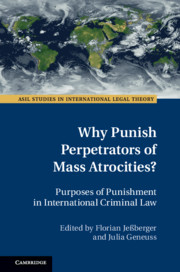Book contents
- Why Punish Perpetrators of Mass Atrocities?
- ASIL Studies in International Legal Theory
- Why Punish Perpetrators of Mass Atrocities?
- Copyright page
- Contents
- Contributors
- Preface
- Abbreviations
- 1 Introduction: The Need for a Robust and Consistent Theory of International Punishment
- 2 The Practical Importance of Theories of Punishment in International Criminal Law
- Part I Setting the Framework: Criminological, Historical and Domestic Perspectives
- 3 Criminology of International Crimes
- 4 Punishment Rationales in International Criminal Jurisprudence
- 5 Punishment and the Domestic Analogy
- 6 Not Much, but Better than Nothing – Purposes of Punishment in International Criminal Law
- 7 The Why Question in International Criminal Punishment – Framing the Landscapes of Asking
- 8 Is International Criminal Law Special?
- Part II Rationales for Punishment in International Criminal Law: Theoretical Perspectives
- Part III Consequences for the Practice of the International Criminal Court
- Select Bibliography
- Index
3 - Criminology of International Crimes
from Part I - Setting the Framework: Criminological, Historical and Domestic Perspectives
Published online by Cambridge University Press: 07 February 2020
- Why Punish Perpetrators of Mass Atrocities?
- ASIL Studies in International Legal Theory
- Why Punish Perpetrators of Mass Atrocities?
- Copyright page
- Contents
- Contributors
- Preface
- Abbreviations
- 1 Introduction: The Need for a Robust and Consistent Theory of International Punishment
- 2 The Practical Importance of Theories of Punishment in International Criminal Law
- Part I Setting the Framework: Criminological, Historical and Domestic Perspectives
- 3 Criminology of International Crimes
- 4 Punishment Rationales in International Criminal Jurisprudence
- 5 Punishment and the Domestic Analogy
- 6 Not Much, but Better than Nothing – Purposes of Punishment in International Criminal Law
- 7 The Why Question in International Criminal Punishment – Framing the Landscapes of Asking
- 8 Is International Criminal Law Special?
- Part II Rationales for Punishment in International Criminal Law: Theoretical Perspectives
- Part III Consequences for the Practice of the International Criminal Court
- Select Bibliography
- Index
Summary
Frank Neubacher looks at theories of punishment in international criminal law from a criminologist's perspective. He addresses three interconnected issues: The purpose of punishment, the explanation of international crimes, and sentencing. As regards the former, he is a strong advocate of a combination of different preventive theories as rationale for (international) punishment, but adds elements of restorative justice. Regarding the explanation of international crimes, he distinguishes three levels: the macro-, meso- and micro-level, connected to the system, the group and the individual, respectively. For Neubacher, it is most important to emphasize that collective violence, in which international crimes are being committed, is a situational process. He explains that when it comes to mass atrocities the perpetrator’s behaviour is illegal, but socially not deviant. Finally, as regards the reaction to international crimes, Neubacher explains that for a deterrent effect to ensue, the certainty of punishment is decisive, not the severity. Regarding the sentencing decisions, he sees a disregard of the individual perpetrator’s circumstances and proposes a more nuanced model of liability (and, thus, culpability) which takes into account the hierarchical position of the perpetrators as well as his or her discretional power.
Keywords
- Type
- Chapter
- Information
- Why Punish Perpetrators of Mass Atrocities?Purposes of Punishment in International Criminal Law, pp. 25 - 44Publisher: Cambridge University PressPrint publication year: 2020
- 1
- Cited by

